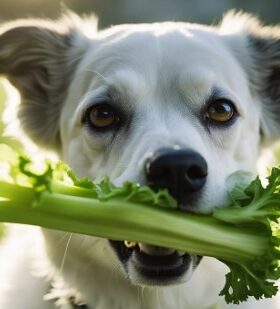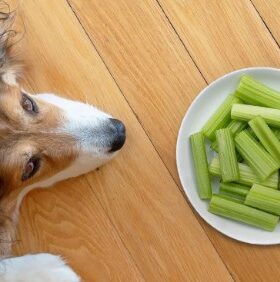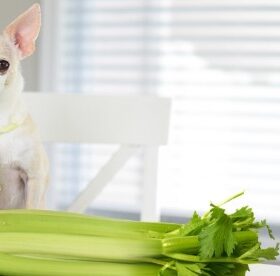Can Dogs Eat Celery Safely

Yes, dogs can safely eat celery in moderation. Celery is not toxic to dogs and provides some beneficial nutrients. It contains lots of water, fiber, vitamins A, K, and C, and minerals like potassium and folate. These all offer health benefits for dogs. The fiber and water in celery may also help with digestion and hydration.
Most adult dogs do well with a few pieces of chopped celery as an occasional treat. It offers a satisfying crunch and can freshen doggy breath. Be sure to introduce celery slowly and watch for any signs of allergic reaction.
The Nutritional Value of Celery for Dogs
Celery contains many vitamins and minerals that can benefit dogs. Here are some of the main nutrients found in celery:
- Water: Celery is 95% water, so it can help keep dogs hydrated.
- Fiber: Celery contains insoluble fiber, which helps regulate digestion. That can aid dogs prone to constipation or diarrhea.
- Vitamin K: Necessary for blood clotting and bone health.
- Vitamin C: An antioxidant that supports the immune system and collagen production.
- Folate: Important for cell growth and replication.
- Potassium: An electrolyte that supports nerve function and blood pressure.
- Manganese: A mineral that assists bone development and metabolism.
So, celery does contain a decent nutritional profile for dogs. The main caveat is that these nutrients are relatively small compared to other veggies. But celery can still provide a health boost.
Can Dogs Eat Celery Safely?
For most dogs, celery is safe to eat and provides a healthy, low-calorie snack. There are a few precautions to keep in mind when feeding celery to dogs:
- Make sure it is cut into small pieces to prevent choking. Celery can be a choking hazard if given whole or in large slices.
- Feed in moderation. While safe, too much celery could cause loose stools or diarrhea.
- Introduce slowly to check for allergies. Some dogs may be allergic to celery. Watch for symptoms like itching, gastrointestinal upset, or skin reactions.
- Avoid giving too much to young puppies. Their digestive systems may have trouble breaking down all the fiber.
Ways to Safely Serve Celery to Dogs
There are several ways to feed celery to provide a safe and appealing snack for dogs:
Raw
The simplest option is to give raw, fresh celery sticks. Ensure they are chopped into small pieces first. Raw celery maintains the highest level of nutrients, too.
Cooked
Lightly cooking celery softens it while still preserving vitamins and minerals. Quickly boil or steam celery before chopping it up for dogs.
Mixed into Food
Chopped or pureed celery can be mixed into dog food. Adding a few tablespoons boosts nutrition and provides some crunch.
As Training Treats
Dehydrated or freeze-dried celery makes handy training treats. Dogs love the crunch and strong scent. Store-bought dehydrated celery treats are available, too.
With Peanut Butter
Smearing a thin layer of dog-safe peanut butter on celery makes it even more enticing. The peanut butter should lightly coat the celery rather than clumping up.
Potential Benefits of Celery for Dogs
Along with general nutrition, there are some specific potential health benefits to feeding dogs celery in moderation:
Hydration
The high water content in celery can supplement a dog’s fluid intake and prevent dehydration. That can be especially helpful on hot summer days or when exercising.
Dental Health
Crunchy fruits and veggies like celery may help scrape off plaque and tartar as dogs chew. This provides a natural teeth-cleaning effect.
Anti-Inflammatory
Some studies have found antioxidant and anti-inflammatory properties in celery. These could help dogs with arthritis, joint issues, or autoimmune conditions. But more research is still needed.
Digestive Aid
The insoluble fiber and water in celery may improve digestion in some dogs. It can add bulk to stool and may relieve constipation.
Skin and Coat Health
Vitamins like A, C, and K, and minerals like folate in celery support skin and coat condition. Its hydration also helps keep skin and fur healthy.

While promising, these benefits need more research to be substantiated fully. Giving a few pieces of celery is safe and provides at least a slight health boost.
Are There Any Risks With Feeding Celery to Dogs?
Celery is considered non-toxic and safe for dogs in small to moderate amounts. However, a few potential risks exist, mainly when dogs overeat celery.
Choking Hazard
One risk is choking if larger pieces of celery are given. Always cut it into small, bite-sized pieces first. Monitor your dog when feeding celery to ensure they are chewing adequately before swallowing.
Intestinal Upset
Too much celery could lead to loose stools, gas, or diarrhea. That is due to the high fiber and water content. Start with small amounts and discontinue use if any gastrointestinal upset occurs.
Allergies
As with any new food, allergies are possible. Dogs may be allergic to celery, so watch for any signs of an allergic reaction when feeding it.
Pesticides
Celery may contain pesticide residue if not organically grown. That could cause illness if your dog consumes enough. Be sure to wash celery thoroughly or buy organic.
Celery Leaves
The leaves contain more nitrates than the stalks. In large amounts, this could cause conditions like anemia or tremors. Avoid feeding too many celery leaves.
With reasonable amounts, most dogs can eat celery without issue. But consult your vet if any concerns arise after feeding it.
What Parts of Celery Can Dogs Eat?
Dogs can eat all parts of celery, both the stalks and leaves. However, the stalks are safer and less prone to cause issues.
Celery Stalks
The entire celery stalk is edible for dogs. This part contains the highest concentration of nutrients and fiber. Chop the stalks before feeding.
Celery Leaves
The leaves are also safe in moderation. However, they contain more nitrates than the stalks. Limit the amount of leaves, and avoid giving them daily.
Celery Seeds
Celery seeds may cause gas, bloating, or gastrointestinal irritation in dogs. It’s best to avoid feeding celery seeds.
Celery stalks and a few leaves are the best choices when giving celery to dogs.
Can Dogs Eat Celery Every Day?
Small amounts of celery every day are generally fine for most dogs. Celery makes a nutritious regular snack.
Around 1-2 stalks of celery per day for a medium or large dog is a reasonable amount. Small dogs should get half that.
When adding it to the daily diet, monitor your dog for any gastrointestinal upset. Stop feeding celery if soft stools or diarrhea occur.
Taking breaks from any treat every few days is also a smart idea. That prevents developing sensitivities. Rotate celery with other fruits and veggies.
Feeding a few pieces of celery daily provides health benefits without risk as long as your dog tolerates it well.
FAQs on Can Dogs Eat Celery
Can puppies eat celery?
Puppies can eat small amounts of celery as an occasional treat. Make sure it is chopped into tiny pieces to reduce choking risk. Limit celery for puppies under 6 months since their digestive systems are still developing.
Is celery a choking hazard for dogs?
Celery can be a choking hazard if fed in large pieces. Always chop or slice celery stalks into small, bite-sized pieces before feeding to dogs.
Should celery be cooked before feeding to dogs?
It’s not necessary to cook celery, but lightly cooking it will soften it up and make it easier to digest. Quick boiling, steaming, or roasting for a few minutes until slightly softened is OK.
How much celery can I give my dog?
Feed celery in moderation, about 1-2 small stalks daily for a medium or large dog. Small dogs should get nearly half that amount. Too much celery could lead to loose stools or diarrhea.
Wrap Up
Celery can be a nutritious and safe snack for dogs when fed in moderation. Its high water content keeps dogs hydrated, while insoluble fiber aids digestion. Celery also provides vitamins A, C, and K, folate, potassium, and manganese – all beneficial nutrients for dogs.
Be sure to introduce celery slowly, watch for allergies, and chop it into bite-sized pieces to reduce choking risk. Cooked celery is also an option for easier digestion. Feed a few small stalks daily, or use celery in dog treat recipes for a healthy, crunchy snack.















